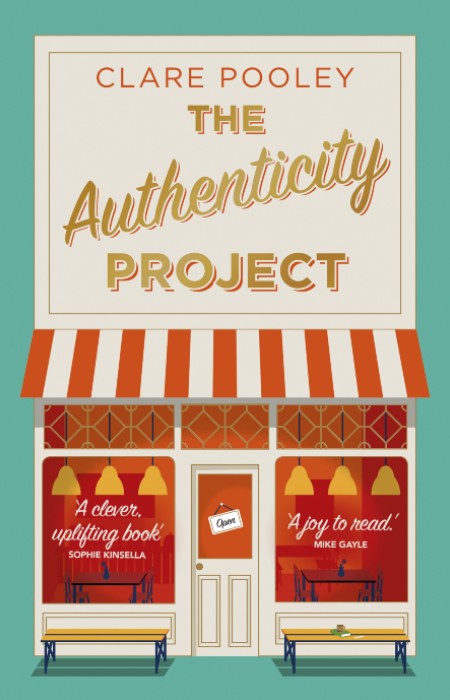
As highly as we might like to think of ourselves, almost all live cloaked in an eclectic assortment of lies, omissions, half-truths, fabricated portrayals and aspirational representation.
It’s not a deliberate intent to deceive that drives us necessarily; rather we are often driven by a need to minimise vulnerability, to be liked or to put a good social foot forward in a society that is often fuelled more by perception than reality.
We are, for all intents and purposes, lying for what we might regard as the very best of reasons.
But what would happens, asks Clare Pooley in London-set The Authenticity Project if we simply decided one day to pull down the barriers and let people see us for who we actually are, stripped of Instagram filters, the need to impress or a fear of being exposed for someone we are not.
It’s an intriguing idea and Pooley is savvy to realise it would not be as utopianly straightforward as we might think; it could, in fact, be a case of one step, quite a few back as we learn to be truthful uncompromisingly and not just where it suits or we think we’ll be able to handle it.
“As Julian walked past the café, he could see Monica negotiating her way around the queue at the counter, carrying a tray of drinks. Monica, he had noticed, was never still. Even when she was sitting she was animated, her jaunty dark ponytail swinging from side to side. When she was concentrating on something, she’d twist a strand of hair round and round her index finger, and when she was listening to someone, she cocked her head to one side, just like his old Jack Russell had done.” (P. 57)
It would also make for great storytelling, and Pooley takes to this with charming gusto, offering a group of people who find being honest about their lives challenging, liberating and and revealing in almost equal measure.
The first character we come across is once-famous painter Julian Jessop who has gone from being a confidante of Vivienne Westwood, Ralph Lauren and Andy Warhol and a flamboyant fashion icon with a vibrant social life and a devoted wife to a 79-year-old has-been whose sole daily highlight is the trip to the High Street to buy groceries.
Julian is no longer the belle of the artistic ball and he is lonely to boot, all of which he lays out in a note book he titles The Authenticity Project, from which the novel of course sensibly takes its title, in which he lays bare the true, sorry extent of his life.
Whether it is an accurate representation of who he is at that point isn’t revealed, rather cleverly, until near the end of this beguilingly beautiful piece of writing, but suffice to say, his admission, flawed or not, opens him to a wholesale change of life that ends transforming not only him but that of the people who end up with the note book after him.
First up is the lovely Monica, a woman who has left a high-powered, lucrative corporate career to open one of those archetypal book-lined cafés we all want to either run or frequent, full of wooden tables, quirky decorations, great food and cafe and a welcoming atmosphere where everyone knows your name and something tantalisingly personal about you too.
Monica might look the very picture of homespun, happy, late-thirties domesticity but she is also longing for love, marriage and babies, something she struggles with since it doesn’t seem very feminist to her but which she deep down cannot relinquish.

She is also, in many ways the heart and soul of this gorgeous novel which answers the cry all of us not just to be truly known but to be part of a grouping, no matter how eclectic, of people who know us deeply and truly and who care enough to drop what they’re doing if they known you need some friendship, love and attention.
As we meet Hazard, an equity trader and alcohol/drug addict who discovers he doesn’t like his old self but who might be able to return to the decent, kind man he once was, and Insta-“perfect” housewife and mother Alice who is struggling to match her beleaguered behind-the-scenes life, warm and welcoming nanny and baby health nurse Lizzie and laconic astonishingly good looking Aussie gardener, we come to understand how the lies we tell ourselves and our perception of self-truth are less skewed by malevolent intent as a great yawning between aspiration and reality.
It’s a gaping chasm into which all tumble sooner or later, in one way or another, and Pooley empathetically and insightfully explores what it means to bare your soul, to truly connect with others and to open your life for good or ill (mostly the former, thankfully) to people who can quickly become your new family.
In the garrulous delights of The Authenticity Project, a novel inspired by the author’s won non-fiction work The Sober Diaries in which Pooley detailed her own battle to quit alcohol addiction, we come to see how rich and rewarding it can be to drop pretense, to put aside filters for unadorned reality and to let people into places which seem inviolably sacrosanct until we realise how freeing it is to have someone see the very worst of us and love us, anyway.
“Suddenly she felt exhausted. The wine and the food she’d eaten with such gusto churned around in her stomach. She thought she was going to be sick, to vomit all over her beautifully laid table. Gold-sprayed rose petals mix chunks of reconstituted carrot. All her new visions of the future, the ridiculously optimistic happy ending that had gradually been forming in her mind, had to be rewound, deleted and overlaid with the bland, featureless plot she’d been used to.” (P. 180)
Spending time with the characters of The Authenticity Project is an absolute delight.
They quickly become like family, to ourselves and to each other, and just like any family, who bond over significant events, personal or societal, and share time and emotional moments with each other, not everything proceeds smoothly or is unstintingly rewarding.
One of the appealing aspects of Pooley’s work is that it feels real and grounded even as it presents us with a rom com-esque, Richard Curtis (Love Actually) view of the world in which good and wonderful things happen but so do terrible, hurtful things too.
The Authenticity Project doesn’t pretend all your troubles go away when you are loved and listened to and included but it does beautifully present the idea that we are infinitely better placed to handle the awful things in life because we are surrounded and enveloped by people who love and care for us.
The joy of reading this book is that for all the picture-perfect moments and idealised scenes, it feels like it could happen, that we could connect with people and have our lives changed and that, challenging though it is, that it is possible to meet and connect with people in such a way that your life is gloriously and wonderfully and forever upended.
Life doesn’t come with any guarantees of happiness and being truly honest about who we are, what we’re feeling and the state of our lives can feel like getting multiple teeth pulled without anaesthetic but it is also inspiring and enlivening and giddily, satisfyingly good for the soul, a critically-important message in an age when we have never been more separate and divided and where we need the transforming richness of connections to others more than ever.